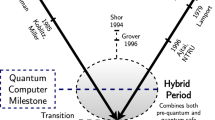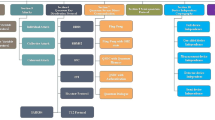Abstract
Information-theoretically secure (ITS) authentication is needed in quantum key distribution (QKD). In this paper, we study security of an ITS authentication scheme proposed by Wegman & Carter, in the case of partially known authentication key. This scheme uses a new authentication key in each authentication attempt, to select a hash function from an Almost Strongly Universal\(_2\) hash function family. The partial knowledge of the attacker is measured as the trace distance between the authentication key distribution and the uniform distribution; this is the usual measure in QKD. We provide direct proofs of security of the scheme, when using partially known key, first in the information-theoretic setting and then in terms of witness indistinguishability as used in the universal composability (UC) framework. We find that if the authentication procedure has a failure probability \(\varepsilon \) and the authentication key has an \(\varepsilon ^{\prime }\) trace distance to the uniform, then under ITS, the adversary’s success probability conditioned on an authentic message-tag pair is only bounded by \(\varepsilon +|\mathcal T |\varepsilon ^{\prime }\), where \(|\mathcal T |\) is the size of the set of tags. Furthermore, the trace distance between the authentication key distribution and the uniform increases to \(|\mathcal T |\varepsilon ^{\prime }\) after having seen an authentic message-tag pair. Despite this, we are able to prove directly that the authenticated channel is indistinguishable from an (ideal) authentic channel (the desired functionality), except with probability less than \(\varepsilon +\varepsilon ^{\prime }\). This proves that the scheme is (\(\varepsilon +\varepsilon ^{\prime }\))-UC-secure, without using the composability theorem.


Similar content being viewed by others
References
Abidin, A.: Weaknesses of Authentication in Quantum Cryptography and Strongly Universal Hash Functions. Linköping Studies in Science and Technology. Licentiate Thesis, Applied Mathematics, The Institute of Technology, Linköping University, (2010)
Abidin, A., Larsson, J.Å.: Vulnerability of “A novel protocol-authentication algorithm ruling out a man-in-the-middle attack in quantum cryptography”. Int. J. Quantum Inf. 7(5), 1047–1052 (2009)
Abidin, A., Larsson, J.Å.: New universal hash functions. In: Lucks, S., Armknecht, F. (eds.) WEWoRC 2011. LNCS, vol. 7242, pp. 99–108. Springer, Berlin (2012)
Atici, M., Stinson, D.R.: Universal hashing and multiple authentication. In: Koblitz, N. (ed.) CRYPTO ’96. LNCS, vol. 1109, pp. 16–30 (1996)
Bennett, C.H., Brassard, G.: Quantum cryptography: public key distribution and coin tossing. In: Proceedings of IEEE International Conference on Computers, Systems and Signal Processing, pp. 175–179. Bangalore, India (1984)
Bierbrauer, J., Johansson, T., Kabatianskii, G., Smeets, B.: On families of hash functions via geometric codes and concatenation. In: Stinson, D. (ed.) CRYPTO ’93. LNCS, vol. 773, pp. 331–342 (1994)
Canetti, R.: Universally composable security: a new paradigm for cryptographic protocols. In: Annual Symposium on Foundations of Computer Science—Proceedings, pp. 136–145 (2001)
Carter, L., Wegman, M.N.: Universal classes of hash functions. J. Comput. Syst. Sci. 18, 143–154 (1979)
Cederlöf, J., Larsson, J.Å.: Security aspects of the authentication used in quantum cryptography. IEEE Trans. Inf. Theory 54(4), 1735–1741 (2008)
den Boer, B.: A simple and key-economical unconditional authentication scheme. J. Comput. Secur. 2, 65–72 (1993)
Ekert, A.K.: Quantum cryptography based on Bell’s theorem. Phys. Rev. Lett. 67, 661–663 (1991)
Feige, U., Shamir, A.: Witness indistinguishability and witness hiding protocols. In: Proceedings of the 22nd ACM Symposium on Theory of Computing, pp. 416–426 (1990)
Hirota, O.: Incompleteness and limit of quantum key distribution theory. arXiv:1208.2106v2 (2012)
Johansson, T., Kabatianskii, G., Smeets, B.: On the relations between A-codes and codes correcting independent errors. In: Stinson, D. (ed.) EUROCRYPT ’93. T. Helleseth, vol. 765, pp. 1–11 (1994)
Krawczyk, H.: LFSR-based hashing and authentication. In: Desmedt, Y. (ed.) CRYPTO ’94. LNCS, vol. 839, pp. 129–139 (1994)
Krawczyk, H.: New hash functions for message authentication. In: Guillou, L.C., Quisquater, J.J. (eds.) EUROCRYPT ’95. LNCS, vol. 921, pp. 301–310 (1995)
Pacher, C., Abidin, A., Lornser, T., Peev, M., Ursin, R., Zeilinger, A., Larsson, J.Å.: Attacks on quantum key distribution protocols that employ non-its authentication. arXiv:1209.0365 (2012)
Portmann, C.: Key recycling in authentication. arXiv:1202.1229v1 (2012)
Renner, R.: Reply to recent scepticism about the foundations of quantum cryptography. arXiv:1209.2423 (2012)
Stinson, D.R.: Combinatorial techniques for universal hashing. J. Comput. Syst. Sci. 48(2), 337–346 (1994). doi:10.1016/S0022-0000(05)80007-8
Stinson, D.R.: Universal hashing and authentication codes. In: Feigenbaum, J. (ed.) CRYPTO ’91. LNCS, vol. 576, pp. 74–85 (1992)
Stinson, D.R.: On the connections between universal hashing, combinatorial designs and error-correcting codes. Congr. Numer. 114, 7–27 (1996)
Stinson, D.R.: Universal hash families and the leftover hash lemma, and applications to cryptography and computing. J. Combin. Math. Combin. Comput. 42, 3–31 (2002)
Wegman, M.N., Carter, L.: New hash functions and their use in authentication and set equality. J. Comput. Syst. Sci. 22, 265–279 (1981)
Yuen, H.: On the foundations of quantum key distribution—reply to Renner and beyond. arXiv:1210.2804v1 (2012)
Author information
Authors and Affiliations
Corresponding author
Rights and permissions
About this article
Cite this article
Abidin, A., Larsson, JÅ. Direct proof of security of Wegman–Carter authentication with partially known key. Quantum Inf Process 13, 2155–2170 (2014). https://doi.org/10.1007/s11128-013-0641-6
Received:
Accepted:
Published:
Issue Date:
DOI: https://doi.org/10.1007/s11128-013-0641-6




